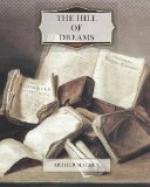thin radiance, filling the spaces of the sounding wood
with a dream of light. He had lost all count
of the track; he felt he had fled for hours, climbing
and descending, and yet not advancing; it was as if
he stood still and the shadows of the land went by,
in a vision. But at last a hedge, high and straggling,
rose before him, and as he broke through it, his feet
slipped, and he fell headlong down a steep bank into
a lane. He lay still, half-stunned, for a moment,
and then rising unsteadily, he looked desperately
into the darkness before him, uncertain and bewildered.
In front it was black as a midnight cellar, and he
turned about, and saw a glint in the distance, as
if a candle were flickering in a farm-house window.
He began to walk with trembling feet towards the light,
when suddenly something pale started out from the shadows
before him, and seemed to swim and float down the
air. He was going down hill, and he hastened
onwards, and he could see the bars of a stile framed
dimly against the sky, and the figure still advanced
with that gliding motion. Then, as the road declined
to the valley, the landmark he had been seeking appeared.
To his right there surged up in the darkness the darker
summit of the Roman fort, and the streaming fire of
the great full moon glowed through the bars of the
wizard oaks, and made a halo shine about the hill.
He was now quite close to the white appearance, and
saw that it was only a woman walking swiftly down
the lane; the floating movement was an effect due
to the somber air and the moon’s glamour.
At the gate, where he had spent so many hours gazing
at the fort, they walked foot to foot, and he saw
it was Annie Morgan.
“Good evening, Master Lucian,” said the
girl, “it’s very dark, sir, indeed.”
“Good evening, Annie,” he answered, calling
her by her name for the first time, and he saw that
she smiled with pleasure. “You are out late,
aren’t you?”
“Yes, sir; but I’ve been taking a bit
of supper to old Mrs. Gibbon. She’s been
very poorly the last few days, and there’s nobody
to do anything for her.”
Then there were really people who helped one another;
kindness and pity were not mere myths, fictions of
“society,” as useful as Doe and Roe, and
as non-existent. The thought struck Lucian with
a shock; the evening’s passion and delirium,
the wild walk and physical fatigue had almost shattered
him in body and mind. He was “degenerate,”
decadent, and the rough rains and blustering
winds of life, which a stronger man would have laughed
at and enjoyed, were to him “hail-storms and
fire-showers.” After all, Messrs Beit,
the publishers, were only sharp men of business, and
these terrible Dixons and Gervases and Colleys merely
the ordinary limited clergy and gentry of a quiet
country town; sturdier sense would have dismissed
Dixon as an old humbug, Stanley Gervase, Esquire, J.P.,
as a “bit of a bounder,” and the ladies
as “rather a shoddy lot.” But he was




